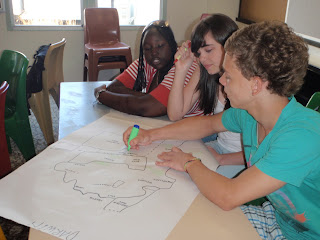Hi everyone :)
Welcome to the 'Our Lives: Culture, Context and Risk' youth sexual health project! My name is Nia, and I am the Program Manager and Project Officer for the project, and I'll be blogging on here regularly, but there are others on our team that might want to drop in a line every now and then.
We've actually been really busy lately, but before I get into that, I'll just give you a bit of info on what the project is actually about. So, the 'Our Lives' research project is a national youth sexual health project funded by the Australian Research Council. What we are trying to do is to determine the socio-cultural influences on the sexual health decision-making of Indigenous young people, particularly in the Northern Territory, South Australia and Western Australia. So, as you can see, it's quite a big area to cover, but it's very important that we include a diverse range of young people - both Indigenous and non-Indigenous - so that we have a sound understanding of how and why they decide to engage in certain risky behaviours - particularly in terms of their sexual health. We need to do this so that we can develop and implement ways for young people to make well-informed decisions regarding their overall health and well-being - ways that are fun and that young people will actually use in their everyday lives. But before we get into that, we have to do quite a bit of research and actually get out there and talk to young people and see what they actually think about all this health stuff. We have a few fun, creative and effective activities or 'research tools' that we use to engage young people in discussing issues related to sexual health, risks and risk-taking behaviours - but I'll get to that a bit later on.
So, currently our Research Team includes:
Dr Kate Senior, Menzies School of Health Research, Darwin, NT
Dr Richard Chenhall, University of Melbourne, Melbourne, VIC
Dr Marian Pitts, LaTrobe University, Melbourne, VIC
Dr Sherry Saggers, National Drug Research Institute, Curtin University, Perth, WA
Dr Victoria Burbank, University of Western Australia, Perth, WA
Dr Tricia Nagel, Menzies School of Health Research, Darwin, NT
Anania Tagaro (that's me!), Menzies School of Health Research, Darwin, NT
Susan McMullen, Menzies School of Health Research, based in Cairns, QLD
Joseph Fitz, Menzies School of Health Research, Darwin, NT
Jolie Lawrence, AMS Research Student, Menzies School of Health Research, Darwin, NT
Everyone in the team has different expertise and skills that they bring to the project. As the project grows, we'll also have other project officers and research assistants that will come on board, particularly once we've established the research project in the different research sites in the NT, SA and WA.
We've accomplished quite a bit since July, and I'll be sure to let you all know about it in the subsequent blogs.
Hope all is well!
Cheers from Our Lives,
Nia






